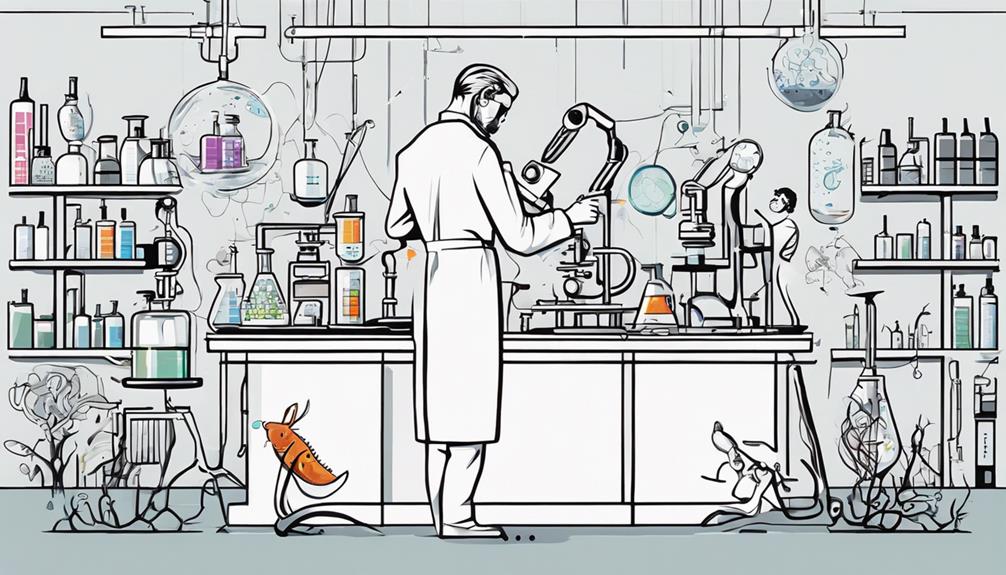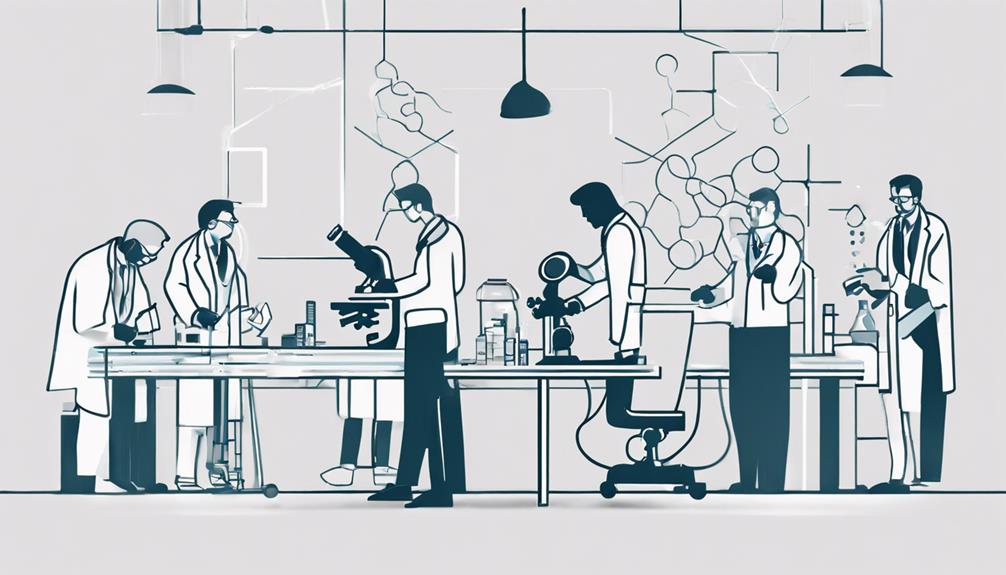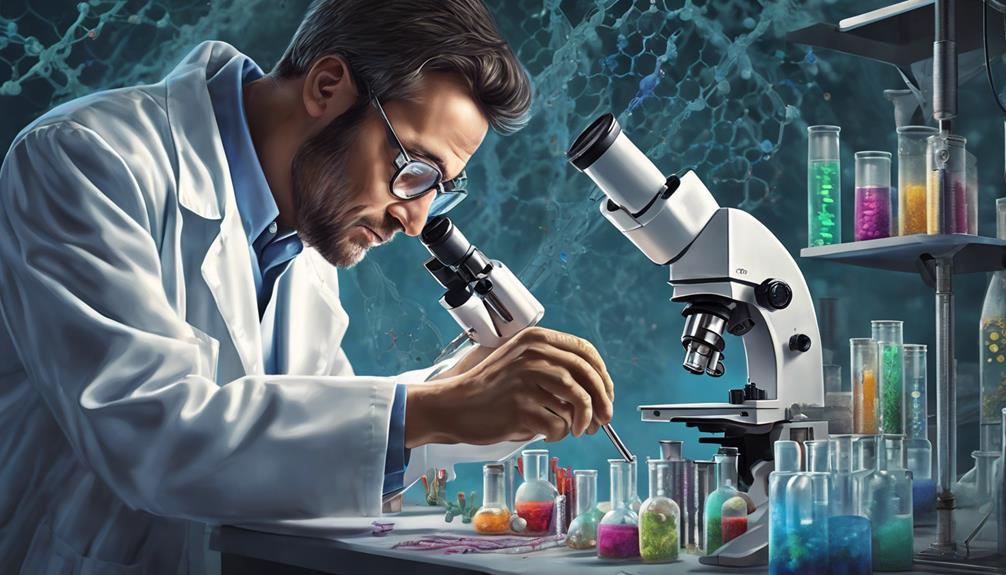The ethical considerations surrounding genetic modification encompass a labyrinth of intriguing dilemmas, from altering the very essence of hereditary information to the broader societal implications of tampering with nature's blueprint. Delving into the morality of reshaping genetic codes prompts critical reflections on the fine line between therapeutic interventions and enhancements, the fairness of accessibility to these technologies, and the overarching principles of justice and equity. As the scientific community continues to push the boundaries of genetic engineering, the ethical discourse evolves in tandem, necessitating a careful balance between innovation and ethical responsibility.
Key Takeaways
- Genetic modification raises ethical concerns about human dignity, long-term implications, and informed consent.
- Ethical considerations in plant modification include environmental impacts, social justice, and informed consent.
- Animal genetic modification requires policies for welfare, terminology standardization, and ethical refinement techniques.
- Implications for biodiversity involve concerns about ecological balance, gene flow impacts, and predicting long-term effects.
Moral Debates on Human Genetic Engineering

In the realm of bioethics, moral debates surrounding human genetic engineering revolve around the ethical considerations associated with altering the human genome. Genetic modification in humans raises profound ethical issues, particularly concerning human dignity and the sanctity of life. The manipulation of genes through techniques like human genome editing and germline modifications poses significant ethical dilemmas.
One key ethical concern is the distinction between using genetic engineering for treating diseases and enhancing desirable traits. This blurs the line between therapy and enhancement, raising questions about the limits and consequences of genetic intervention. Moreover, the long-term implications on future generations and the potential unintended consequences of altering the genetic makeup of individuals are subjects of intense ethical scrutiny.
Ethical research in genetic engineering emphasizes the importance of informed consent, autonomy, and responsible decision-making. The ethical framework surrounding human genetic modification underscores the need for careful deliberation, transparency, and ensuring that the benefits outweigh the risks to safeguard human health and well-being.
Ethical Considerations in Plant Modification
Amid the advancements in plant modification technologies, the ethical considerations surrounding genetic alterations in plants have become a focal point of discussion within the agricultural and scientific communities. Ethical questions arise regarding the use of gene editing to modify plant genomes and the potential environmental impacts of such modifications. Balancing the benefits of increased crop yield and nutritional content against the risks to biodiversity is a key ethical dilemma. Furthermore, issues of informed consent from consumers regarding the consumption of genetically modified crops and the importance of transparent labeling are central to the ethical debate on plant modification. The ethical framework for genetic modification in plants also extends to considerations of social justice, particularly in relation to global food security and equitable access to genetically modified crops. Dilemmas around ownership and patenting of genetically modified plants further complicate the ethical landscape in the agricultural industry. Addressing these ethical challenges is crucial for ensuring responsible and sustainable plant modification practices.
Animal Genetic Modification and Ethics

Exploring the ethical dimensions of genetic modification in animals involves a critical examination of welfare implications and individual impact. Policies and guidelines are being developed to monitor the welfare of genetically modified animals, ensuring that ethical standards are upheld in genetic engineering practices. Terminologies such as genetically modified, transgenic, and biotechnology-derived are commonly used in discussions surrounding animal genetic engineering, highlighting the varied approaches and techniques employed in this field. Refinement techniques are continually evolving to minimize the invasiveness of genetic engineering procedures on animals, emphasizing the importance of reducing any potential harm or distress caused during the modification process. Veterinarians play a pivotal role in overseeing the welfare and ethical treatment of genetically engineered animals, using their expertise to advocate for the well-being of these animals and ensure that ethical considerations are at the forefront of genetic modification practices. Through a combination of stringent policies, advanced techniques, and expert oversight, the ethical landscape of animal genetic modification continues to evolve towards more responsible and welfare-focused approaches.
Implications for Biodiversity and Ecosystems
Genetic modification poses significant challenges to biodiversity and ecosystems due to the potential introduction of non-native genes and the subsequent impacts on ecological dynamics. Altered organisms resulting from genetic modification may outcompete native species, disrupting the delicate ecological balance. Concerns also arise regarding gene flow from genetically modified organisms to wild populations, potentially affecting the genetic diversity of natural species. Furthermore, the unintended consequences of genetic modification on ecosystems can be challenging to predict and control, raising ethical considerations about the long-term effects on biodiversity and ecosystem stability.
Implications for Biodiversity and Ecosystems:
- Genetic modification can lead to the introduction of non-native genes into ecosystems.
- Altered organisms may disrupt the ecological balance by outcompeting native species.
- Concerns exist about gene flow from genetically modified organisms impacting the genetic diversity of wild populations.
Regulatory Frameworks and Oversight

Establishing robust regulatory frameworks and oversight mechanisms is imperative to ensure the safe and ethical application of gene editing technologies in both research and clinical contexts. Regulatory frameworks play a crucial role in setting standards for the safety and accuracy of genetic modification interventions. Oversight mechanisms are essential for monitoring and enforcing compliance with these regulations to prevent potential risks and ethical challenges. Global standards are necessary to harmonize the ethical use of gene-editing technologies worldwide, ensuring consistency and accountability across borders. Responsible risk-benefit calculations are fundamental in evaluating the potential outcomes of genetic modification interventions and guiding decision-making processes. Collaboration among stakeholders, including scientists, policymakers, and ethicists, is key to addressing ethical dilemmas and promoting the responsible advancement of gene-editing technologies. By adhering to stringent regulatory frameworks, implementing effective oversight mechanisms, and fostering global collaboration, the ethical considerations surrounding genetic modification can be properly managed for the benefit of society.
Frequently Asked Questions
What Are the Ethical Issues of Genetic Modification?
Ethical issues of genetic modification encompass a wide array of concerns, including environmental impact, animal welfare, informed consent, social justice, genetic discrimination, privacy rights, cultural implications, global regulations, long-term effects, and equity issues. Balancing advancements in genetic modification with these ethical considerations is crucial for ensuring responsible and ethical practices in the field. Careful deliberation and robust regulatory frameworks are essential in addressing these complex ethical dilemmas.
What Are the Ethical Considerations of Genetics?
Ethical considerations in genetics encompass a spectrum of concerns ranging from consent implications to equity considerations, touching on social, environmental, and privacy concerns. Discussions also extend to cultural impacts, legal implications, moral dilemmas, religious beliefs, and global perspectives. These multifaceted ethical dimensions underscore the need for a comprehensive and nuanced approach to navigating the complexities of genetic research and technology.
What Are the Ethics of Human Genetic Engineering?
Genetic enhancement, particularly in the context of human genetic engineering, evokes discussions centered on the moral implications of altering DNA to create designer babies. The inherent risks, consent issues, and concerns over social inequality and manipulation raise significant ethical dilemmas. These debates underscore the importance of considering unforeseen consequences, upholding medical ethics, and protecting privacy rights within the realm of genetic modification.
Are There Any Ethical Concerns With Genetic Medicine?
Ethical concerns in genetic medicine encompass issues such as informed consent, privacy concerns, genetic discrimination, environmental impact, social justice, cultural implications, ownership rights, safety regulations, religious beliefs, and long-term effects. These considerations are critical in ensuring ethical practices within genetic medicine. Addressing these concerns is essential for upholding patient autonomy, maintaining confidentiality, and promoting transparency in genetic medicine. Ethical decision-making in genetic medicine requires a thorough examination of these complex factors to navigate potential ethical dilemmas effectively.
Conclusion
In conclusion, the ethics of genetic modification present a complex landscape of moral debates and considerations across human, plant, and animal domains. Regulatory frameworks and oversight mechanisms play a crucial role in ensuring responsible application of gene-editing technologies. One striking statistic is that as of 2020, over 40 countries have legislation in place regulating the use of genetic modification in humans, highlighting the global significance of ethical discussions in this field.
